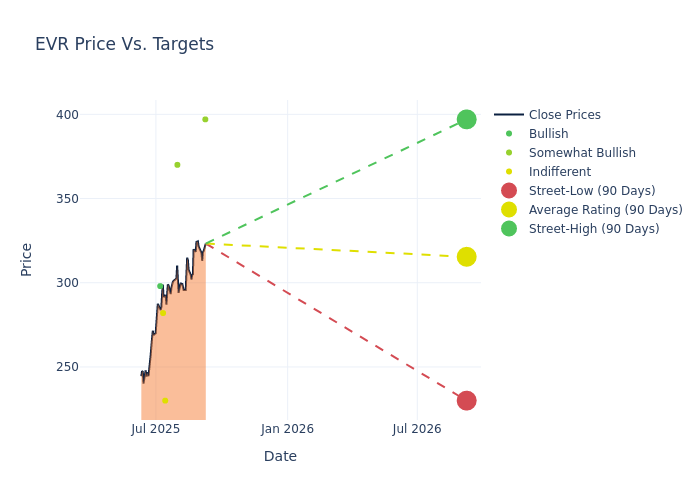Assessing Evercore: Insights From 8 Financial Analysts
8 analysts have shared their evaluations of Evercore (NYSE:EVR) during the recent three months, expressing a mix of bullish and bearish perspectives.
The table below provides a snapshot of their recent ratings, showcasing how sentiments have evolved over the past 30 days and comparing them to the preceding months.
| Bullish | Somewhat Bullish | Indifferent | Somewhat Bearish | Bearish | |
|---|---|---|---|---|---|
| Total Ratings | 1 | 5 | 2 | 0 | 0 |
| Last 30D | 0 | 1 | 0 | 0 | 0 |
| 1M Ago | 0 | 0 | 0 | 0 | 0 |
| 2M Ago | 0 | 3 | 2 | 0 | 0 |
| 3M Ago | 1 | 1 | 0 | 0 | 0 |
The 12-month price targets assessed by analysts reveal further insights, featuring an average target of $321.12, a high estimate of $397.00, and a low estimate of $230.00. This upward trend is evident, with the current average reflecting a 21.52% increase from the previous average price target of $264.25.

Understanding Analyst Ratings: A Comprehensive Breakdown
The standing of Evercore among financial experts becomes clear with a thorough analysis of recent analyst actions. The summary below outlines key analysts, their recent evaluations, and adjustments to ratings and price targets.
| Analyst | Analyst Firm | Action Taken | Rating | Current Price Target | Prior Price Target |
|---|---|---|---|---|---|
| Ryan Kenny | Morgan Stanley | Raises | Overweight | $397.00 | $315.00 |
| Ryan Kenny | Morgan Stanley | Raises | Overweight | $315.00 | $312.00 |
| Alex Bond | Keefe, Bruyette & Woods | Raises | Outperform | $370.00 | $365.00 |
| Brian Fitzgerald | JMP Securities | Maintains | Market Perform | $230.00 | $230.00 |
| Aidan Hall | Keefe, Bruyette & Woods | Raises | Outperform | $365.00 | $257.00 |
| Michael Brown | Wells Fargo | Raises | Equal-Weight | $282.00 | $194.00 |
| James Yaro | Goldman Sachs | Raises | Buy | $298.00 | $266.00 |
| Ryan Kenny | Morgan Stanley | Raises | Overweight | $312.00 | $175.00 |
Key Insights:
- Action Taken: Responding to changing market dynamics and company performance, analysts update their recommendations. Whether they 'Maintain', 'Raise', or 'Lower' their stance, it signifies their response to recent developments related to Evercore. This offers insight into analysts' perspectives on the current state of the company.
- Rating: Gaining insights, analysts provide qualitative assessments, ranging from 'Outperform' to 'Underperform'. These ratings reflect expectations for the relative performance of Evercore compared to the broader market.
- Price Targets: Delving into movements, analysts provide estimates for the future value of Evercore's stock. This analysis reveals shifts in analysts' expectations over time.
Assessing these analyst evaluations alongside crucial financial indicators can provide a comprehensive overview of Evercore's market position. Stay informed and make well-judged decisions with the assistance of our Ratings Table.
Stay up to date on Evercore analyst ratings.
Discovering Evercore: A Closer Look
Evercore Inc is an independent investment bank that derives the majority of its revenue from financial advisory, including merger, acquisition, and restructuring advisory. It also has institutional equities trading, equity underwriting, and investment management businesses that account for around 20% of net revenue. The company was founded in 1996 and went public in 2006. Evercore had approximately 2,380 employees at the end of 2024, and about 75% of its revenue is derived from the United States.
Unraveling the Financial Story of Evercore
Market Capitalization Analysis: Falling below industry benchmarks, the company's market capitalization reflects a reduced size compared to peers. This positioning may be influenced by factors such as growth expectations or operational capacity.
Revenue Growth: Evercore displayed positive results in 3M. As of 30 June, 2025, the company achieved a solid revenue growth rate of approximately 20.98%. This indicates a notable increase in the company's top-line earnings. As compared to its peers, the company achieved a growth rate higher than the average among peers in Financials sector.
Net Margin: Evercore's net margin is below industry averages, indicating potential challenges in maintaining strong profitability. With a net margin of 11.66%, the company may face hurdles in effective cost management.
Return on Equity (ROE): Evercore's ROE surpasses industry standards, highlighting the company's exceptional financial performance. With an impressive 6.15% ROE, the company effectively utilizes shareholder equity capital.
Return on Assets (ROA): Evercore's ROA surpasses industry standards, highlighting the company's exceptional financial performance. With an impressive 2.79% ROA, the company effectively utilizes its assets for optimal returns.
Debt Management: With a below-average debt-to-equity ratio of 0.56, Evercore adopts a prudent financial strategy, indicating a balanced approach to debt management.
Understanding the Relevance of Analyst Ratings
Ratings come from analysts, or specialists within banking and financial systems that report for specific stocks or defined sectors (typically once per quarter for each stock). Analysts usually derive their information from company conference calls and meetings, financial statements, and conversations with important insiders to reach their decisions.
Some analysts publish their predictions for metrics such as growth estimates, earnings, and revenue to provide additional guidance with their ratings. When using analyst ratings, it is important to keep in mind that stock and sector analysts are also human and are only offering their opinions to investors.
Which Stocks Are Analysts Recommending Now?
Benzinga Edge gives you instant access to all major analyst upgrades, downgrades, and price targets. Sort by accuracy, upside potential, and more. Click here to stay ahead of the market.
This article was generated by Benzinga's automated content engine and reviewed by an editor.
 Nasdaq
Nasdaq Wall Street Journal
Wall Street Journal